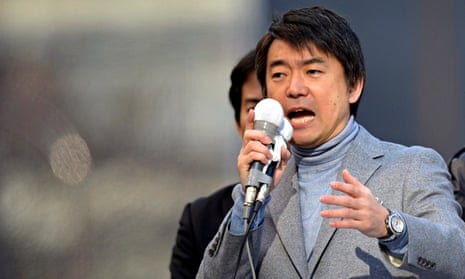Police in Japan have placed a rightwing extremist group on its watchlist for the first time amid growing international pressure to crack down on a rise in hate speech against the country’s Korean community.
In its annual security report published this week, the National Police Agency said Zaitokukai, an ultra-nationalist group that claims it has 15,000 members, should be considered a potential threat to law and order.
Zaitokukai calls for the end to welfare and other “privileges” afforded to about half a million non-naturalised members of Japan’s ethnic Korean community, including the descendants of labourers brought over from the Korean peninsula to work in mines and factories before and during the second world war.
It frequently holds demonstrations, often in parts of cities such as Tokyo and Osaka with large Korean populations. Its supporters have described ethnic Koreans as “criminals” and “cockroaches” and called for them to be killed. Police said Zaitokukai and other far-right groups had held more than 100 rallies in the first 10 months of this year.
The police agency report – which usually targets members of Japan’s vast network of yakuza gangs – warned Zaitokukai was a potential threat to the public due to its “extreme nationalist and xenophobic” ideology.
Zaitokukai’s inclusion in the security watch list is unprecedented and comes months after Eriko Yamatani, who as minister for public security is Japan’s most senior police official, failed to publicly condemn the group.
Yamatani was invited to distance herself from Zaitokukai this October after a 2009 photograph emerged of her with Shigeo Masuki, then a senior member of the group. She told journalists she did not recall the photograph being taken, adding that it was not appropriate to comment on the policies of individual groups.
“Japan has a long history of placing great value on the idea of harmony and respecting the rights of everyone,” she said.
In July, a court in Osaka ruled that a Zaitokukai demonstration held near a school in Kyoto with links to a North Korean residents group amounted to racial discrimination.
In October, Osaka’s mayor, Toru Hashimoto, confronted Zaitokukai’s then leader, Makoto Sakurai, during a one-on-one debate, labelling him and his supporters racists who were not welcome in the city. The debate ended after just a few minutes, with both men hurling insults at each other and, at one point, appearing on the verge of physical violence.
The UN committee on the elimination of racial discrimination has called on Japan to address hate speech and incitement to racist violence during demonstrations, and to punish public officials and politicians who disseminate hate speech. This week South Korea’s national assembly adopted a resolution urging Japan to take similar measures.
